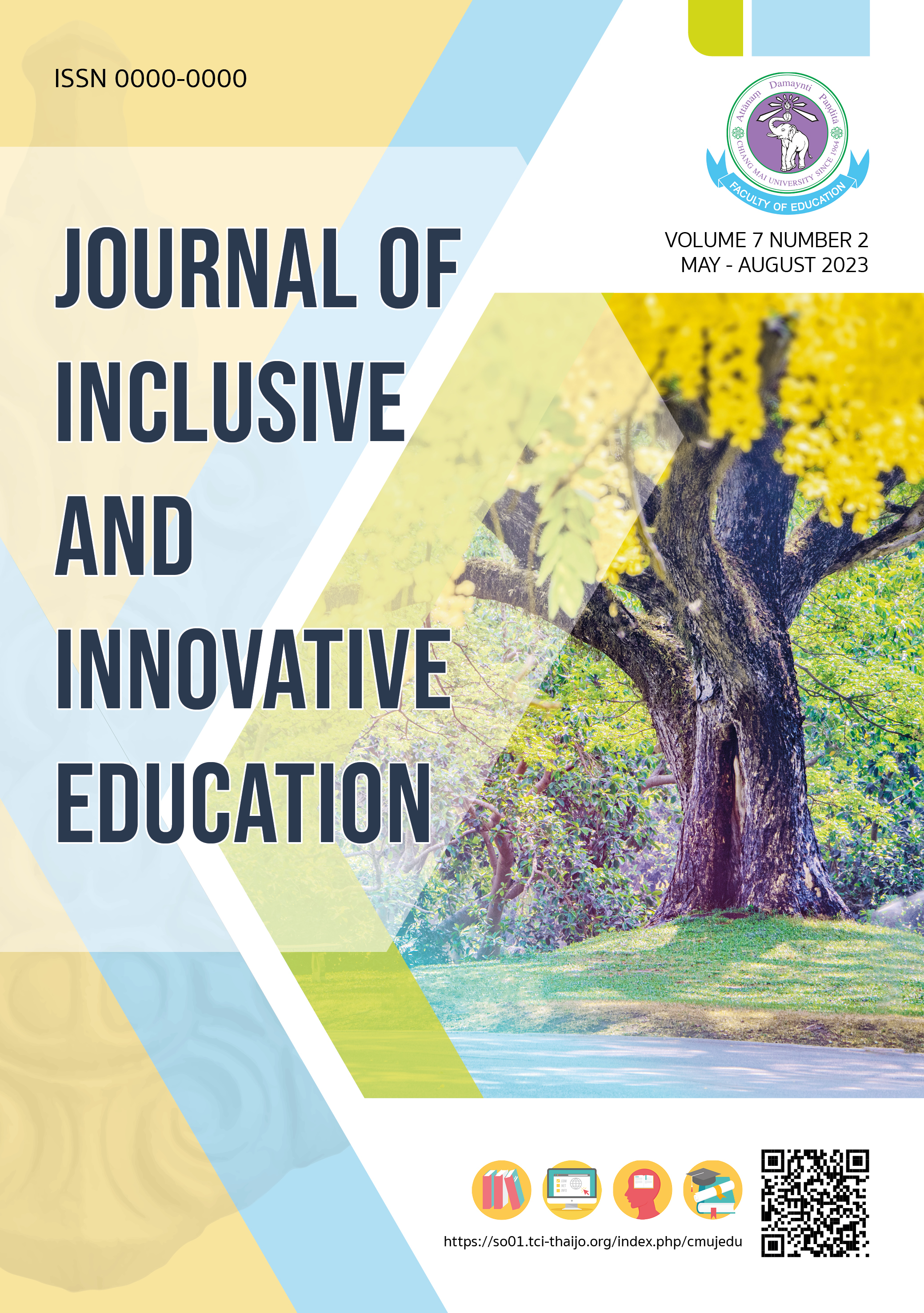ผลการจัดประสบการณ์ดนตรีตามแนวคิดของคาร์ล ออร์ฟ ที่มีต่อความเข้าใจแบบรูปและความสัมพันธ์ของเด็กปฐมวัย
Main Article Content
บทคัดย่อ
การศึกษาครั้งนี้มีวัตถุประสงค์เพื่อศึกษาผลของการจัดประสบการณ์ดนตรีตามแนวคิดของคาร์ล ออร์ฟ ที่มีต่อความเข้าใจแบบรูปและความสัมพันธ์ของเด็กปฐมวัย กลุ่มตัวอย่าง คือ เด็กอายุ 5-6 ปี ที่กำลังศึกษาอยู่ชั้นอนุบาล 3 ภาคเรียนที่ 2 ปีการศึกษา 2565 โรงเรียนอนุบาลพรพระร่วง กรุงเทพมหานคร จำนวน 25 คน ได้มาโดยวิธีการสุ่มแบบกลุ่ม เครื่องมือศึกษาประกอบด้วย แผนการจัดประสบการณ์ดนตรีตามแนวคิดของคาร์ล ออร์ฟ 24 แผน แบบประเมินความเข้าใจแบบรูปและความสัมพันธ์ของเด็กปฐมวัย แบบบันทึกพฤติกรรม วิเคราะห์ข้อมูลโดยใช้ค่าเฉลี่ย ส่วนเบี่ยงเบนมาตรฐาน การทดสอบค่าที และวิเคราะห์เนื้อหา ผลการศึกษาพบว่า เด็กปฐมวัยที่ได้รับการจัดประสบการณ์ดนตรีตามแนวคิดของคาร์ล ออร์ฟ มีความเข้าใจแบบรูปและความสัมพันธ์สูงขึ้นอย่างมีนัยสำคัญทางสถิติที่ระดับ.05 ทั้งโดยรวมและรายด้าน เด็กได้สังเกต และเลียนแบบแบบรูปและความสัมพันธ์จากการร้องตัวโน้ต ร้องเพลง และใช้ร่างกายประกอบจังหวะ คาดคะเน ทำซ้ำจนสามารถสร้างแบบรูปและความสัมพันธ์ในลักษณะใหม่ได้
Article Details

อนุญาตภายใต้เงื่อนไข Creative Commons Attribution-NonCommercial-NoDerivatives 4.0 International License.
หากผู้เสนอบทความมีความจำเป็นเร่งด่วนในการตีพิมพ์โปรดส่งลงตีพิมพ์ในวารสารฉบับอื่นแทน โดยกองบรรณาธิการจะไม่รับบทความหากผู้เสนอบทความไม่ปฏิบัติตามเงื่อนไขและขั้นตอนที่กำหนดอย่างเคร่งครัด ข้อมูลของเนื้อหาในบทความถือเป็นลิขสิทธิ์ของ Journal of Inclusive and Innovative Education คณะศึกษาศาสตร์ มหาวิทยาลัยเชียงใหม่
เอกสารอ้างอิง
Bruner, J. S. (1966). Toward a Theory of Instruction, 59. Harvard University Press. Retrieved from https://books.google.co.th/books?hl=th&lr=&id=F_d96D9FmbUC&oi=fnd&pg=PA1&dq=Bruner,+J.S. +1956.+Toward+a+theory+of+instruction&ots=yVVR87G_wG&sig=voQQ_vE0BS771NKkA9SMyVLRW nI&redir_esc=y#v=onepage&q=Bruner%2C%20J.S.%201956.%20Toward%20a%20theory%20of%20 instruction&f=false.
Chimma, K. (2022). The Effects of Providing Pattern and Relationship Activities related to Objects Pictures, and Language on Analytical Thinking Skill of Young Children. Bangkok: Kasetsart University. [in Thai]
Goodkin, D. (2002). Play, Sing, and Dance: An Introduction to Orff Schulwerk. Miami: Schott.
Manitoba Education and Advanced Learning. (2014). Kindergarten Mathematics–Support Document for Teachers: Manitoba Curriculum Framework of Outcomes. Winnipeg, MB: Manitoba Education.Retrieved from https://www.edu.gov.mb.ca/k12/cur/math/k_support/full_doc.pdf
Ministry of Education of Thailand. (2017). The Early Childhood Curriculum B.E. 2560 (A.D. 2017). Bangkok: Teachers Council of Thailand Printing House Ladprao. [in Thai]
Ministry of Education Republic of Singapore. (2013). Nurturing Early Learners, A Curriculum for Kindergartens in Singapore Mumeracy. 3, Singapore. Retrieved from https://www.nel.moe.edu.sg/qql/slot/u143/Resources/Downloadable/pdf/nel-guide/nel-edu-guide-numeracy.pdf.
Nakwong, T. (1999). Teaching Carl Orff-Schulwerk’s Music for Young Children.
Bangkok: Kasetsart University Press. [in Thai]
Piaget, J. (1959). The Language and Thought of the Child. London: Psychology Press.
Samahito, C. (2019). Phenomenon-Based Learning Experience Provision for Young Children. Silpakorn University Journal, 39(1), 113-129. [in Thai]
Shamrock, M. (1997). Orff Schulwerk: Brief history, description and issues in international Dispersal. California: Great impressions.
Southcott, J., & Cosaitis, W. (2012). " It all begins with the beat of a drum": Early Australian encounters with Orff Schulwerk. Australian Journal of Music Education, (2), 20-32.
Sritep T. (2015). The Carl Orff Musical Experience Provision to Develop Social-Emotional Skills of Preschool Children with Autism. Kasetsart Educational Review. 32(2), 110-120. [in Thai]
The Institute for the Promotion of Teaching Science and Technology. (2017). Framework and Guidelines to Integrate Science, Technology and Mathematics in Early Childhood based on Early Childhood Curriculum B.E. 2560. Bangkok: Gogoprint Thailand Press. [in Thai]
Udomrati, P. (2022). Knowledge Development to Promote and Restore Early Childhood Development After Situation of the Epidemic of COVID-2019. Bangkok: Office of the Education Council, Ministry of Education. [in Thai]
Vygotsky, L. S., & Cole, M. (1978). Mind in Society: Development of Higher Psychological Processes. Massachusetts: Harvard University Press.
Yuhasriati, Y. & Yuriansa, A. (2018). Patterns playing for early childhood education: Mathematics learning for early childhood education. Journal of Physics: Conference Series, 1088, 012099.
Zippert, E. L., Douglas, A. A., & Rittle-Johnson, B. (2020). Finding patterns in objects and numbers: Repeating patterning in pre-K predicts kindergarten mathematics knowledge. Journal of Experimental Child Psychology. 1-39.


